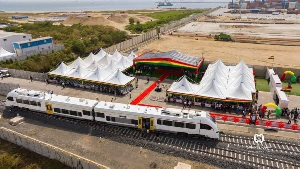Independent presidential candidate, Marricke Kofi Gane has reacted to the debate on the legislation of Okada business saying the increasing rate of the business is due to the weak centralised intracity transport networks.
He blamed the situation on several causes indicating that "the economic gaps within our main cosmopolitan capitals that drive their continuing demand – they are a triage source of rent, income and enabling inexpensive logistics."
"The lack of enforcement of traffic regulations within especially our metropolitan areas.”
Mr Kofi Gane said to solve the problem, we have to tackle the fundamental cause and stop the usual politicisation of issues in the country.
"It has to be about solving the fundamental problems that gave rise to their prominence in the first place – efficient central transport, effective city road networks, traffic enforcement and monetization of Indiscipline, reducing unemployment, regional decentralization (not just political and administrative) and local manufacturing or assembling of same for domestic value retention.
This, is where we seem to always miss it – the persistent attempt to proffer short term “politically emotional” solutions, instead of holistic longer-term ones. It may even be useful to a limited extent, to bring some formality to niches of their service delivery, i.e. deliveries/logistics and tourism.”
Read his opinion below;
THE DEBATE ABOUT OKADAS, should also necessarily be about:
1) The lack of or weak centralised intracity transport networks;
2) The huge unemployment bulge among the 17-38-year-olds;
3) The surging (+50%) rural-urban migration and the lack of decentralized development across other non-cosmopolitan regions;
4) The economic gaps within our main cosmopolitan capitals that drive their continuing demand – they are a triage source of rent, income and enabling inexpensive logistics.
5) The lack of enforcement of traffic regulations within especially our metropolitan areas.
Solving the problem cannot be reduced to the usual political banter of either simply banning or regulating them. It has to be about solving the fundamental problems that gave rise to their prominence in the first place – efficient central transport, effective city road networks, traffic enforcement and monetization of Indiscipline, reducing unemployment, regional decentralization (not just political and administrative) and local manufacturing or assembling of same for domestic value retention.
This is where we seem to always miss it – the persistent attempt to proffer short term “politically emotional” solutions, instead of holistic longer-term ones. It may even be useful to a limited extent, to bring some formality to niches of their service delivery, i.e. deliveries/logistics and tourism.
These are the only ways we can kill three birds with one stone – bring order/sanity to our city traffic long term, improve earnings for riders and Government and improve productivity for city workers. The bigger question will also be – what is the vision we have for our cities, their economy, convenience, modernity and efficiency and WHAT do we need to do, to get it? What is the vision for our cities?
General News of Thursday, 27 August 2020
Source: rainbowradioonline.com

















